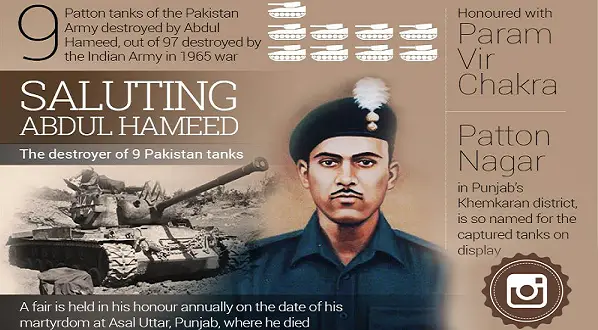Hello, Warriors.
A mere 60 kilometers separates the tiny village of Asal Uttar from the Harmandir Sahib, Sikhism’s holiest shrine in Amritsar. The village itself is as unremarkable as the flat plains abutting state highway 21 that connects it to Amritsar, but just a couple of kilometers short of it lies a memorial to arguably India’s greatest military hero, Havildar Abdul Hamid.
Hamid was 20 years old when he was recruited at Varanasi into the Army. After undergoing his training at the Grenadiers Regimental Centre at Nasirabad, he was posted to 4 Grenadiers in 1955. Initially, he served in a rifle company and was then posted to a recoilless platoon. He fought in the ’62 war in Thang La, then in the North-East Frontier Province, as part of the 7 Mountain Brigade, 4 Mountain Division, and came back disappointed with the war. After ceasefire was declared his unit moved to Ambala where Abdul Hamid was appointed Company Quarter Master Havildar (CQMH) of an administration company.
When Pakistan attacked in the Rann of Kutch area in April 1965, 4 Grenadiers was ordered to move forward and to collect their 106 RCL guns from the nearest ordnance depot. Hamid was one of the non-commissioned instructors. Due to absence of anti-tank detachment commanders, he was told to take over an antitank detachment. A very good marksman and an expert anti-tank gunner with a new anti-tank gun at his disposal, he made a big difference to the outcome of the war.
His bravery was truly described in the citation awarded to him which read:
The citation for the Param Vir Chakra awarded to him read:
COMPANY QUARTER MASTER HAVILDAR ABDUL HAMID
4 GRENADIERS (NO 2639985)
At 0800 hours on 10 September 1965 Pakistan forces launched an attack with a regiment of Patton tanks on a vital area ahead of village Cheema on the Bhikkiwind road in the Khem Karam Sector. Intense artillery shelling preceded the attack. The enemy tanks penetrated the forward position by 0900 hours. Realising the grave situation, Company Quarter Master Havildar Abdul Hamid who was commander of an RCL gun detachment moved out to a flanking position with his gun mounted on a jeep, under intense enemy shelling and tank fire. Taking an advantageous position, he knocked out the leading enemy tank and then swiftly changing his position, he sent another tank up in flames. By this time the enemy tanks in the area spotted him and brought his jeep under concentrated machine-gun and high explosive fire. Undeterred, Company Quarter Master Havildar Abdul Hamid kept on firing on yet another enemy tank with his recoilless gun. While doing so, he was mortally wounded by an enemy high explosive shell.
Havildar Abdul Hamid’s brave action inspired his comrades to put up a gallant fight and to beat back the heavy tank assault by the enemy. His complete disregard for his personal safety during the operation and his sustained acts of bravery in the face of constant enemy fire were a shining example not only to his unit but also to the whole division and were in the highest traditions of the Indian Army.
The two major wars of 1965 and 1971 saw Muslim officers and men across ranks and services acquit themselves creditably in keeping with the traditions of the Indian armed forces giving the lie to the false narrative advanced prior to Partition: That their careers were best advanced by moving to Pakistan, a fact which was proven wrong by the brave hearted CQMH Abdul Hamid.






